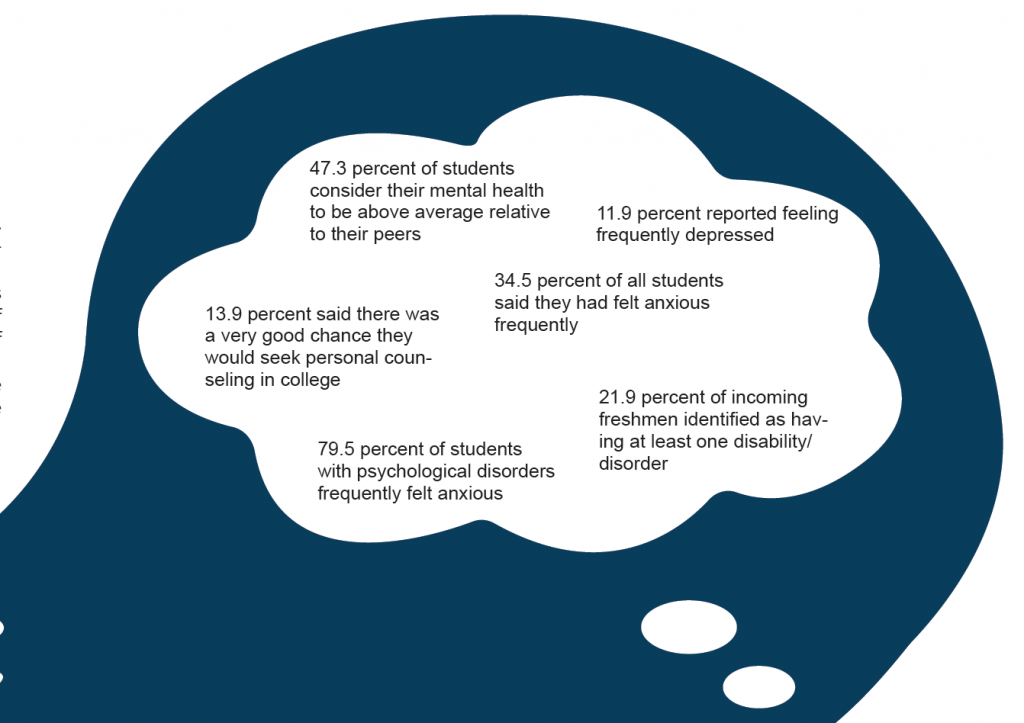
UCLA HERI Freshman Survey from 2016. Graphic by: Sarah Massey | Production Manager
Mental health issues among college students in the U.S. are on the rise and many Ferris students hope that awareness of mental health rises as well.
Often categorized as a taboo topic, mental health issues are seen as weaknesses and are not talked about out of fear of being judged, according to Ferris professional golf management freshman Ben Strong.
“People think it’s fake,” Strong said. “People don’t believe in a lot of it, especially anxiety. A lot of people don’t believe it’s a thing—that it’s just a made-up thing just to get attention. But I’ve firsthand dealt with it, so I believe that it’s a true thing and that fear is stronger than anything else.”
The University of California, Los Angeles’ Higher Education Research Institute’s annual Freshman Survey in 2016 found record-breaking statistics in regard to students’ mental health. Of the incoming first-time, full-time college students surveyed, 34.5 percent reported that they frequently felt anxious and 11.9 percent said they frequently felt depressed in the past year.
“People stigmatize mental health problems and mental health problems are as common as a sore throat,” Ferris adjunct instructor Joe Verschaeve said.
Out of the 13,798 students enrolled at Ferris in the fall of 2017, 1,827 were freshmen and 780 of those freshmen were from other states, as recorded in the Ferris Fact Book. According to Ferris pre-veterinary medicine freshman and Chicago native Megan Johnson, the complete change of scenery has affected her mental health.
“I moved completely away where I didn’t know anybody and no one from my high school came here. So being kind of alone in this town and this whole new state, that was definitely a big thing for me because I didn’t have my cat, I didn’t have my friends, I didn’t have my family,” Johnson said.
Ferris academic advisor and licensed professional counselor Timberly Boezwinkle said that she believes mental health issues among young people are getting worse.
“I think that there are stressful things that they are dealing with now that they haven’t had to deal with in the past,” Boezwinkle said. “First and foremost is social media and all the contact with everybody. I think that adds to a lot of stress, personal misconceptions and a lot of confusion on many different levels that can add to that mental health component.”
The Freshman Survey was based on responses from 137,456 traditional freshmen from 184 U.S. colleges and universities. In 2016, it reported that 47.3 percent of the students perceived their own mental health to be above average in relation to their peers, which is the lowest this statistic has been since the survey began in 1966. 40.9 percent of students also said they spent more than six hours a week on social media in 2016.
Comparison to others is an aspect of social media that Boezwinkle believes affects students significantly.
“I don’t think they realize how much—and this is my opinion—on social media is what people want you to see. It’s not the complete story, so they are making their judgments and determ i nations based on very small bits of information,” Boezwinkle said. “And sometimes I think they go looking for the information that they want and that’s not always accurate. It’s all very superficial and quick and there’s no depth in much of anything they’re getting.”
Johnson, however, said that she believes that while there are many negative things on social media, it has been positive for her mental health as well.
“I think it depends, because I do know a lot of people who have mental health issues turn to the internet. For me, I have a lot of friends I’ve made online, so I’m more comfortable talking to them about mental health than my own friends I see every day,” Johnson said.
Boezwinkle said that most people believe that mental health isn’t treatable and they treat it as something that identifies them. She also said that many students don’t always know what it means to have anxiety or depression.
“Anxiety and depression actually, if treated effectively, can go away. I think there are probably people struggling with anxiety and depression and don’t know it,” Boezwinkle said. “Anxiety, yes, is nervousness but there is so much more to each one of those. If you’re depressed, it doesn’t always present as being sad or down. Oftentimes, you know, there’s much more to it and there are varying degrees of it.”
The Personal Counseling Center on campus is open 8 a.m. to noon and 1 to 5 p.m. with crisis walk-ins available for students who are struggling with suicide. Students can also call the National Suicide Prevention Line at (800) 273- 8255.
Click here for more from the Torch’s News section.
